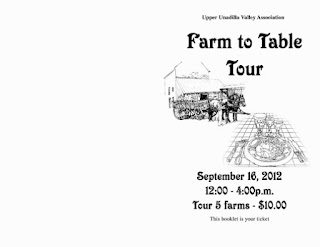The reason I am posting about homemade ricotta has mainly to do with our goats and uses of their goats milk. Early on in my farming life, I read about Coach Farms also in NYS, and how successful they have been with goat's cheese - chevre - the fresh kind. Twenty years later, we have goats, and our herd is growing. Now I have to decide what is the best use of the goat's milk! Since our farm is specializing in all things Neopolitan pizza - I thought it may be good to see how homemade ricotta comes out with some goats milk and some heavy cream from cows milk. We have a really great dairy - Evans Farmhouse - that makes a decadent heavy cream - so yellow/cream colored and rich.
Nearby to the farm, we already have 2 cheesemakers - one that makes raw milk aged cheeses of different varieties. And another that makes the chevre. So I thought instead of duplicating their work - (I use their cheese on our pies too) - and I'll try a different cheese and see how it comes. I know a dairy nearby that produces curds and I'll work with them on fresh mozzarella.
Ultimately, the pizzas will be entirely fresh picked and locally grown and baked all right here in the Unadilla Valley and expanding to other areas of the Northeast. I've had the idea to freeze prepared veggies and meals since 2005 and things are only finally coming to fruition. We already grow the tomatoes, basil, garlic and the cheeses, mushrooms, other herbs can be purchased from others. To be continued...
A New Identity: Alica's Pepperpot
8 years ago





